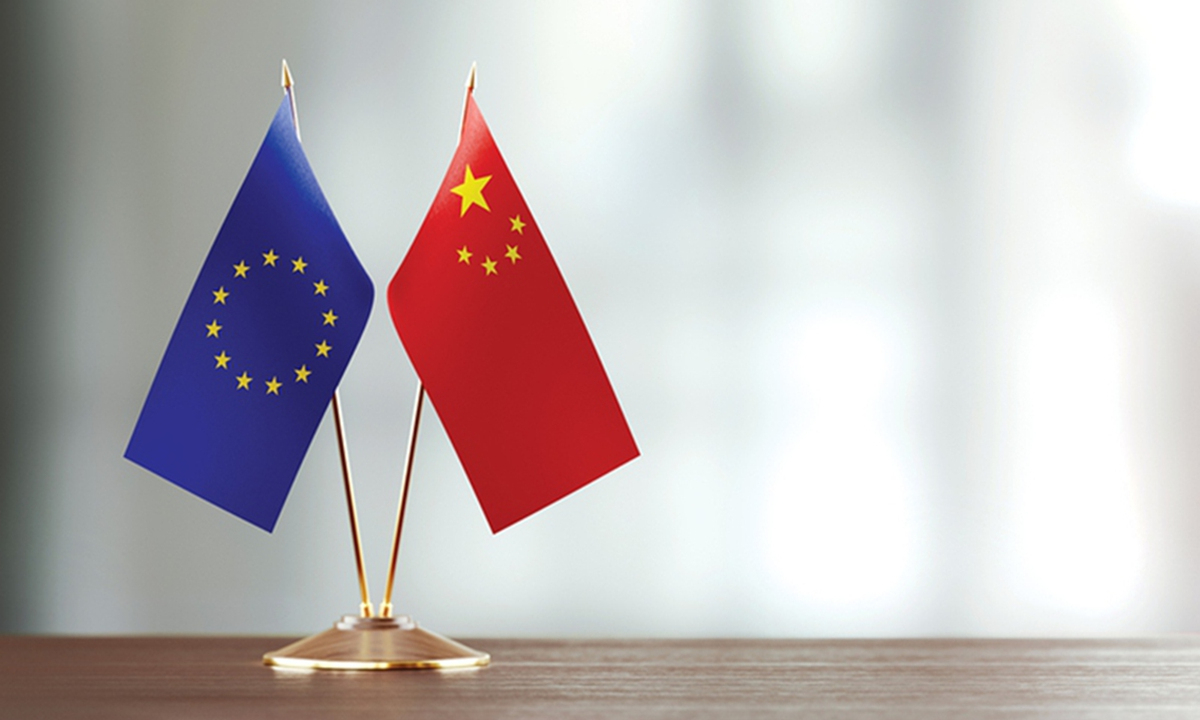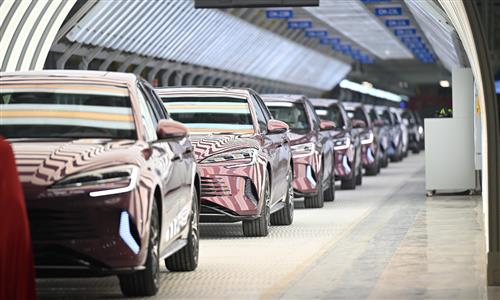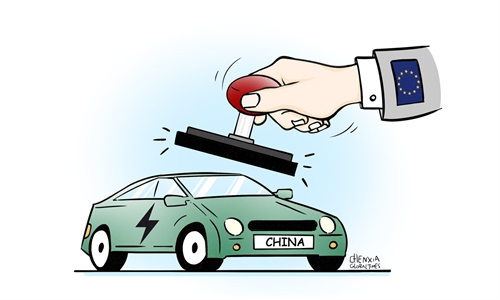EU 'should seek cooperation' with China on NEVs, not backpedaling on its climate goal: experts

China EU Photo: VCG
The EU should seek cooperation with China on new-energy vehicles (NEVs) so as to tap the great complementarities between the two vital trading partners, rather than taking a protectionist path, Chinese observers said on Monday, commenting on the latest development of opinions on NEVs within the EU.
The comments came as China's commerce minister is reportedly expected to start a visit to Europe this month over the European Commission's investigation into Chinese NEVs.
Experts said that it is wiser for the EU to work with China on the issue so that the two trade partners can tap their strong economic complementarities, noting that Chinese NEVs are a contributing, not an undermining, factor for the EU's climate goals.
The EU's probe into Chinese NEVs is not conducive to deepening cooperation in the new-energy industries of both parties and it will also affect the interests of EU consumers, they noted.
Manfred Weber, a German lawmaker heading a center-right European party in the European Parliament, criticized the EU climate policy and accused China of profiting from it, according to German news outlet DPA on Sunday.
The (EU) Green Deal should not become a "China Deal," said Weber, noting the growing number of electric carmakers from China entering the European market.
The EU's plan to ban the sale of new internal combustion engine cars by 2035 has met with resistance from Germany. A proposal was drafted to make exceptions for cars that use climate-neutral fuels.
Cui Dongshu, secretary-general of the China Passenger Car Association, told the Global Times on Monday that backpedaling on the path toward a green, low-carbon future, such as using combustion engine cars with environmentally friendly fuels, is not in the best interests of the EU.
"Cooperation between Chinese and EU industries is the right way for Europe to get out of its conundrum, and concerns can be ironed out by dialogue and cooperation by the two sides," Cui said, noting that the Chinese side is willing to negotiate with its European counterparts to reach reasonable terms concerning cooperation on NEVs.
Currently, Chinese NEVs mainly arrive in the European market as finished goods but industry insiders said that Chinese carmakers can also consider setting up plants in the EU to localize production and bring greater benefits to the local community, but they face issues such as the EU's strict environmental threshold.
In an interview in March, Vicky Pollard, head of the Unit in the European Commission's Directorate General for Climate Action, told the Global Times that there are high complementarities between the EU and China since both sides are affected by climate change and both have clear targets to pursue in the green transition.
"The relative lead enjoyed by Chinese EV makers is the result of market-driven competition amid an overall transition by countries toward green transportation vehicles," Yang Chengyu, an associate research fellow at the Institute of European Studies of the Chinese Academy of Social Sciences, told the Global Times on Monday. "China and the EU must not allow the dispute over NEVs to affect and disrupt normal economic and trade cooperation between the two sides."
The development of China's NEV sector came from its strong innovation capability, complete manufacturing system and strong supply chains, Yang said.
"Chinese EV makers can provide proof to EU investigators to address their concerns on subsidies during the production process while maintaining their advantages in higher cost-performance," Yang said.
In February, Chinese Commerce Minister Wang Wentao said in his meeting with Executive Vice-president of the European Commission Valdis Dombrovskis in Abu Dhabi that China is highly concerned about the EU's trade remedy investigation targeting Chinese EVs and other products, while also expressing strong dissatisfaction regarding the investigation, which lacks a factual basis.
The EU has made moves targeting Chinese NEV imports in recent months. Following its investigation into Chinese-made NEVs in October, it required registration for NEV imports originating in China in March.
Affected by these actions, the number of Chinese NEV exports to the EU dropped by nearly 20 percent year-on-year during the January-February period, while the value dropped by one-third, customs data showed.
Still, a number of Chinese companies continued with their EU plans, attracted by the EU's mature automotive market.
On March 28, Chinese EV automaker XPeng Motors followed up on its plan to make more inroads into the EU market by beginning to sell two models in Germany.



